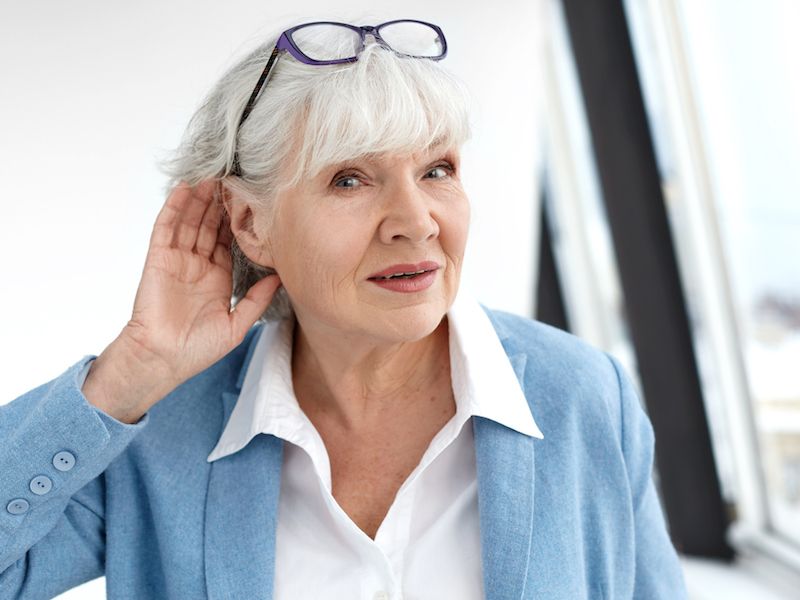Hearing and vision loss in the elderly

With aging come progressive changes in the functioning of our senses, mainly that of hearing and vision. These senses, which provide us with information about the world around us, become less acute with age, affecting the quality of life.
Hearing and vision problems in older people alter the way we communicate with others and enjoy multiple activities. For this reason, sensory disturbances can lead to isolation of the older person. In the face of these challenges, family members and/or caregivers need to be aware of any changes in the older person’s visual and hearing abilities.
If any warning signs appear, it will be necessary to go to the doctor in order to obtain a diagnosis and start the most appropriate treatment.
Vision loss in the elderly
The problems derived from altered vision result in not being able to observe clearly, triggering falls, situations of difficulty in interacting with the environment or going out into the street.
This generates a feeling of isolation in the old person and possibly triggers depressions. In order to prevent and cure vision diseases typical of old age, it is recommended that the elderly person undergo ophthalmological check-ups on a regular basis.
Why do you lose your sight with age?
From the age of sixty-five onwards, about 30 percent of people have vision problems, although only a few suffer significant impairment to limit their daily activities.
From that age onwards, pupils decrease in size and react slowly in the presence of light and darkness. On the other hand, the eye muscles lose flexibility, so the eyes are less able to rotate, while the lens (our natural lens) becomes opaque and yellowish, and the fat pads that provide eye support are reduced.
Diseases that cause vision loss
Presbyopia
It is an almost inevitable condition that can manifest itself from the age of 40 onwards. The condition occurs as a result of the aging of the eye, with the consequent loss of elasticity of the lens. There is no cure, but glasses allow you to see objects that are close.
Glaucoma
When the intraocular pressure is high, injuries to the optic nerve occur, so the patient experiences loss of side or peripheral vision, as well as blurred vision, headaches and flying fly vision.
Cataracts
As a result of age, the lens loses its transparency due to the accumulation of proteins. The patient experiences loss of visual acuity, which increases progressively. Cataracts can be treated through surgery.
Age-related macular degeneration (AMD)
This disorder destroys both acute and central vision. It is a condition that can occur in adults over 60. It appears when the blood vessels that supply the macula (located in the retina) are damaged. In an advanced stage, there is no treatment capable of restoring vision. If it is detected in time, it is possible to delay its progression through the administration of vitamins and antioxidants.
Diabetic Retinopathy
It occurs as a result of poorly controlled diabetes. Most of the time it does not produce symptoms and when it appears the most frequent are the scotomas (spots in the visual field) and a bad central vision due to the macula affectation.

Symptoms of vision loss
Some of the signs and symptoms associated with vision loss are problems recognizing people and problems related to daily activities such as signing, walking up and down stairs, watching TV, and difficulty reading.
This is because the patient suffers from blurred vision, problems seeing in bright light, seeing flying flies, spots or flashes. Other symptoms include headaches, burning, pain, dizziness and momentary vision loss.
How do you help an older person with impaired vision?
- The first thing to do in this type of situation is to get the patient to stand up for himself, instead of doing all his own thing. You have to support them, but give them room to be independent.
- The environment should abound with specially designed objects (telephones with large keys, magnifying glasses, audio books, etc.) and contrasting decorative elements.
- Describing the places where you are and the things that happen around you can help and guide people with severe visual loss.
Hearing loss in the elderly
As we age, gradual hearing loss is common. About 30 percent of people between the ages of 65 and 75 have some degree of hearing loss. After the age of 75, this percentage rises to 50 percent.
Why can you lose your hearing?
The main causes of hearing loss are listed:
- Earwax plugs.
- Acoustic trauma, resulting from prolonged exposure to loud noise.
- Genetic component.
- infections from viruses or bacteria
- certain medications, head injuries, or tumors
- age-related hearing loss
Symptoms of hearing loss
Signs and symptoms of hearing loss include
- Problems hearing the sound of consonants.
- Difficulty understanding in noisy places, or when there is a crowd.
- Need to turn up the volume on the radio or television.
- Abstention from certain social settings and events.
- Asking others to raise their voices, or to speak clearly
Diseases of the ear in the elderly
Presbycusis
It is the most common pathology of hearing loss in older people. It consists of an aging process of the bones of the ear. It generates a decrease in hearing sensitivity, as well as incomprehension of speech.
Hearing loss
This is a chronic health problem in which the ability to perceive the intensity of sounds is lost. Mild hearing loss is treated with hearing aids, while moderate and severe hearing loss is treated with cochlear implants.
Degenerative ear disease
It consists of the accumulation of fluid in the inner ear. This condition causes severe dizziness, whistling in the ear, and hearing loss.
